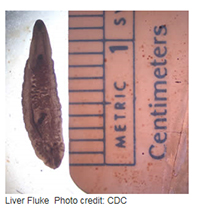Public Health
Bile Duct Cancer and Liver Fluke Infection - What You Need to Know


Bile duct cancer (also called cholangiocarcinoma) is a rare cancer of the biliary duct system. While it is rare, bile duct cancer becomes more common as people grow older.
While most military personnel in Southeast Asia, including Vietnam, ate canned meals or other meals provided by the military, some Veterans may have eaten raw or undercooked freshwater fish during their service. These Veterans might have been infected with tiny parasitic worms called liver flukes, which are found in the fresh waters of Southeast Asia. If eaten, liver flukes can grow to adulthood inside the human biliary duct system. The irritation and scarring caused by liver fluke infection can lead to bile duct cancer. Liver flukes are able to live for up to 25 years, so those ingested during the Vietnam War would no longer be alive in the bile ducts of Veterans.
Currently, there is no validated test of liver fluke infection available for clinical use in the United States. Tests used in a recent research project are not specific for the fluke in Vietnam.
Liver fluke infection is just one cause of bile duct cancer. Two of the major risk factors are infection with the Hepatitis B or C viruses. Other risk factors are primary sclerosing cholangitis, chronic ulcerative colitis, cysts in the bile ducts, cirrhosis of the liver, diabetes, obesity, alcohol use, smoking, and genetic factors. According to current research, the occurrence of bile duct cancer is not increased in U.S. Vietnam War Veterans when compared to other groups of people in the U.S.
The symptoms of bile duct cancer include jaundice (yellowing of the skin and the whites of the eyes), pain in the abdomen, dark urine, light or ‘clay’ colored stool, fever, itchy skin, nausea and vomiting, and unexplained weight loss. If you are concerned about bile duct cancer, please talk to your health care provider.
Learn more about bile duct cancer and liver fluke infection at https://www.publichealth.va.gov/exposures/infectious-diseases/cholangiocarcinoma.asp. Learn more about liver flukes at https://www.cdc.gov/parasites/liver_flukes/.



















